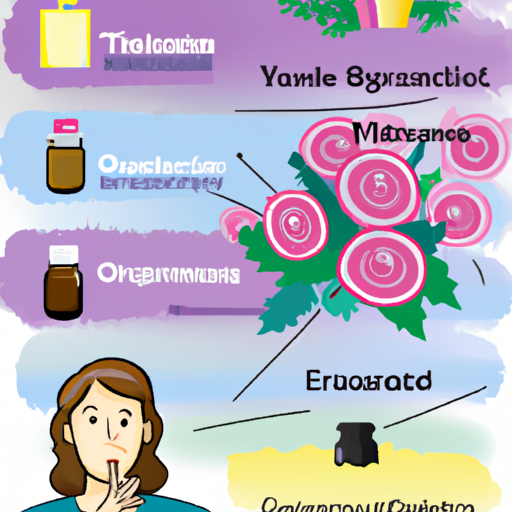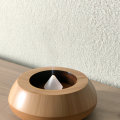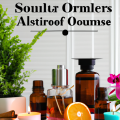-
Table of Contents
- Introduction
- What Are the Risks of Inhaling Essential Oils?
- How to Safely Inhale Essential Oils
- What Are the Benefits of Inhaling Essential Oils?
- How to Choose the Right Essential Oils for Inhalation
- What Are the Best Practices for Inhaling Essential Oils?
- How to Make Your Own Essential Oil Inhaler
- What Are the Different Ways to Inhale Essential Oils?
- Q&A
- Conclusion
Introduction
Inhaling essential oils is a popular way to enjoy the therapeutic benefits of aromatherapy. Essential oils are highly concentrated plant extracts that are used for their therapeutic properties. While inhaling essential oils can be beneficial, it is important to understand the potential risks associated with this practice. This article will discuss the safety of inhaling essential oils, as well as the potential risks and benefits.
What Are the Risks of Inhaling Essential Oils?
Inhaling essential oils can be a pleasant and therapeutic experience, but it is important to be aware of the potential risks associated with this practice. Essential oils are highly concentrated and can cause irritation to the lungs and mucous membranes when inhaled. In some cases, this can lead to respiratory problems such as asthma, bronchitis, and even pneumonia.
Inhaling essential oils can also cause skin irritation, especially if the oils are applied directly to the skin. This can lead to redness, itching, and burning sensations. In some cases, it can even cause an allergic reaction.
Inhaling essential oils can also be dangerous if the oils are not properly diluted. Undiluted essential oils can be toxic and can cause serious health problems if ingested. Inhaling undiluted essential oils can also cause irritation to the lungs and mucous membranes.
Finally, it is important to be aware that some essential oils can be toxic if inhaled in large quantities. This is especially true of oils such as camphor, eucalyptus, and wintergreen. It is important to use these oils in moderation and to always dilute them before use.
In conclusion, inhaling essential oils can be a pleasant and therapeutic experience, but it is important to be aware of the potential risks associated with this practice. Essential oils are highly concentrated and can cause irritation to the lungs and mucous membranes when inhaled. In some cases, this can lead to respiratory problems such as asthma, bronchitis, and even pneumonia. Inhaling essential oils can also cause skin irritation and can be dangerous if the oils are not properly diluted. Finally, some essential oils can be toxic if inhaled in large quantities. For these reasons, it is important to use essential oils in moderation and to always dilute them before use.
How to Safely Inhale Essential Oils
Inhaling essential oils is a popular way to enjoy their therapeutic benefits. However, it is important to take certain precautions when inhaling essential oils to ensure safety.
The first step is to dilute the essential oil with a carrier oil. This is especially important for those with sensitive skin or respiratory issues. A good rule of thumb is to mix one drop of essential oil with four drops of carrier oil.
Next, it is important to use an appropriate diffuser. There are several types of diffusers available, including ultrasonic, nebulizing, and heat diffusers. Each type of diffuser has its own advantages and disadvantages, so it is important to research the best option for your needs.
It is also important to be aware of the safety guidelines for each essential oil. Some essential oils should not be used in a diffuser, while others should only be used in small amounts. It is important to read the safety information for each essential oil before using it.
Finally, it is important to be aware of the potential side effects of inhaling essential oils. Some people may experience headaches, nausea, or dizziness. If any of these symptoms occur, it is important to stop using the essential oil and seek medical attention if necessary.
Inhaling essential oils can be a great way to enjoy their therapeutic benefits. However, it is important to take the necessary precautions to ensure safety. By diluting the essential oil, using an appropriate diffuser, and following the safety guidelines for each essential oil, you can safely enjoy the benefits of essential oils.
What Are the Benefits of Inhaling Essential Oils?
Inhaling essential oils is a popular practice that has been used for centuries to promote physical and emotional wellbeing. Essential oils are highly concentrated plant extracts that contain a variety of compounds that can be beneficial when inhaled. The benefits of inhaling essential oils include improved mood, relaxation, improved sleep, and relief from stress and anxiety.
Inhaling essential oils can help to improve mood and reduce stress. The compounds in essential oils can interact with the olfactory system, which is responsible for the sense of smell. When inhaled, these compounds can stimulate the release of hormones such as serotonin and dopamine, which are known to have a calming and uplifting effect on the body and mind.
Inhaling essential oils can also help to promote relaxation and improve sleep. The compounds in essential oils can interact with the limbic system, which is responsible for regulating emotions and controlling the body’s stress response. When inhaled, these compounds can help to reduce stress and anxiety, which can lead to improved sleep quality.
Inhaling essential oils can also help to reduce inflammation and improve respiratory health. The compounds in essential oils can interact with the respiratory system, which can help to reduce inflammation and improve breathing. Inhaling essential oils can also help to reduce the symptoms of allergies and asthma.
In conclusion, inhaling essential oils can provide a variety of benefits, including improved mood, relaxation, improved sleep, and relief from stress and anxiety. Inhaling essential oils can also help to reduce inflammation and improve respiratory health. For these reasons, inhaling essential oils is a popular practice that has been used for centuries to promote physical and emotional wellbeing.
How to Choose the Right Essential Oils for Inhalation
Inhalation of essential oils is a popular way to enjoy the therapeutic benefits of aromatherapy. Essential oils are highly concentrated plant extracts that contain a variety of compounds that can have a positive effect on physical and emotional wellbeing. When selecting essential oils for inhalation, it is important to consider the desired effect, the safety of the oil, and the quality of the oil.
When choosing essential oils for inhalation, it is important to consider the desired effect. Different essential oils have different properties and can be used to achieve different results. For example, lavender oil is known for its calming and relaxing effects, while peppermint oil can help to clear the mind and improve focus. It is important to research the properties of each oil to ensure that the desired effect is achieved.
Safety is also an important factor to consider when selecting essential oils for inhalation. Some essential oils can be irritating to the skin or mucous membranes, and some can be toxic if ingested. It is important to read the safety information provided by the manufacturer and to dilute the oil with a carrier oil before use.
Finally, it is important to consider the quality of the essential oil. Essential oils are highly concentrated and can vary in quality depending on the source and the extraction process. It is important to purchase essential oils from a reputable supplier to ensure that the oil is pure and of the highest quality.
By considering the desired effect, safety, and quality of the essential oil, it is possible to choose the right essential oils for inhalation. With the right essential oils, inhalation can be a safe and effective way to enjoy the therapeutic benefits of aromatherapy.
What Are the Best Practices for Inhaling Essential Oils?
Inhaling essential oils is a popular way to enjoy the therapeutic benefits of aromatherapy. However, it is important to follow best practices to ensure safe and effective use. Here are some tips for inhaling essential oils:
1. Dilute the oil: Essential oils are highly concentrated and should be diluted with a carrier oil before being applied to the skin or inhaled.
2. Use a diffuser: A diffuser is a device that disperses essential oils into the air. This is the safest and most effective way to inhale essential oils.
3. Start slow: When inhaling essential oils, start with a low concentration and gradually increase the amount.
4. Avoid contact with eyes: Essential oils should never be applied directly to the eyes or mucous membranes.
5. Be aware of allergies: Some people may be allergic to certain essential oils. If you experience any adverse reactions, stop using the oil immediately.
6. Consult a professional: If you are pregnant, nursing, or have a medical condition, it is best to consult a qualified aromatherapist or healthcare provider before using essential oils.
By following these best practices, you can safely and effectively enjoy the therapeutic benefits of aromatherapy.
How to Make Your Own Essential Oil Inhaler
Essential oil inhalers are a great way to enjoy the benefits of aromatherapy without having to use a diffuser. They are small, portable, and easy to use. Making your own essential oil inhaler is a simple process that requires only a few materials.
To make your own essential oil inhaler, you will need:
• An empty inhaler tube
• Cotton wick
• Essential oil of your choice
• Scissors
• Tweezers
• A small bowl
• A paper towel
First, cut the cotton wick to the desired length. The wick should be long enough to fit inside the inhaler tube with some extra length to spare.
Next, place the wick in the small bowl and add a few drops of your chosen essential oil. Allow the wick to soak up the oil for a few minutes.
Once the wick is saturated with oil, use the tweezers to remove it from the bowl and place it inside the inhaler tube. Make sure the wick is centered in the tube and that it is not too tightly packed.
Secure the inhaler tube with the cap and place it on a paper towel. This will help absorb any excess oil that may have leaked out.
Your essential oil inhaler is now ready to use. Simply place the inhaler near your nose and inhale deeply. You can also place the inhaler in your pocket or purse for easy access.
Making your own essential oil inhaler is a simple and cost-effective way to enjoy the benefits of aromatherapy. With just a few materials and a few minutes of your time, you can create a personalized inhaler that you can use anytime, anywhere.
What Are the Different Ways to Inhale Essential Oils?
Essential oils are highly concentrated plant extracts that are used for a variety of purposes, including aromatherapy, massage, and skin care. Inhaling essential oils is one of the most popular ways to benefit from their therapeutic properties. There are several different methods for inhaling essential oils, each of which has its own advantages and disadvantages.
The most common way to inhale essential oils is through direct inhalation. This method involves placing a few drops of essential oil onto a tissue or cotton ball and inhaling the aroma directly. This is a simple and convenient way to enjoy the benefits of essential oils, but it may not be as effective as other methods.
Another popular way to inhale essential oils is through a diffuser. A diffuser is a device that disperses essential oils into the air. This method is more effective than direct inhalation, as it allows the essential oils to be dispersed throughout the room. Diffusers come in a variety of styles, including electric, candle-powered, and ultrasonic.
Steam inhalation is another popular method for inhaling essential oils. This method involves adding a few drops of essential oil to a bowl of hot water and then inhaling the steam. This method is more effective than direct inhalation, as the steam helps to disperse the essential oils more evenly.
Finally, some people choose to inhale essential oils through a nasal inhaler. This device is designed to deliver a precise dose of essential oil directly to the nasal passages. This method is more effective than direct inhalation, as it allows the essential oils to be absorbed directly into the bloodstream.
In conclusion, there are several different ways to inhale essential oils. Direct inhalation, diffusers, steam inhalation, and nasal inhalers are all popular methods for enjoying the therapeutic benefits of essential oils. Each method has its own advantages and disadvantages, so it is important to choose the one that best suits your needs.
Q&A
1. Is it safe to inhale essential oils?
Yes, it is generally safe to inhale essential oils, as long as you are using a high-quality, therapeutic grade oil. Inhaling essential oils can be beneficial for your health and wellbeing, as it can help to reduce stress, improve mood, and even boost your immune system.
2. What are the risks of inhaling essential oils?
Inhaling essential oils can be beneficial, but there are some risks associated with it. If you are pregnant, have asthma, or have any other respiratory conditions, it is important to consult with your doctor before using essential oils. Additionally, it is important to use caution when using essential oils around children and pets, as they can be toxic if ingested.
3. How do I safely inhale essential oils?
The safest way to inhale essential oils is to use a diffuser. This will disperse the oil into the air, allowing you to inhale the therapeutic benefits without having to directly inhale the oil. You can also use a steam inhalation method, where you add a few drops of essential oil to a bowl of hot water and then inhale the steam.
4. Are there any essential oils that should not be inhaled?
Yes, there are some essential oils that should not be inhaled, such as eucalyptus, camphor, and wintergreen. These oils can be irritating to the lungs and can cause respiratory issues. Additionally, some essential oils can be toxic if ingested, so it is important to use caution when using them.
5. Can I use essential oils topically and inhale them at the same time?
Yes, you can use essential oils topically and inhale them at the same time. However, it is important to use caution when doing so, as some essential oils can be irritating to the skin. Additionally, it is important to use a carrier oil when applying essential oils topically, as this will help to dilute the oil and reduce the risk of irritation.
6. How long should I inhale essential oils?
It is generally recommended to inhale essential oils for no more than 10 minutes at a time. Inhaling essential oils for too long can cause irritation to the lungs and can be dangerous. Additionally, it is important to take breaks between inhalations to allow your body to rest and recover.
7. Are there any other safety precautions I should take when using essential oils?
Yes, there are some safety precautions you should take when using essential oils. It is important to use high-quality, therapeutic grade oils, as these are the safest and most effective. Additionally, it is important to use caution when using essential oils around children and pets, as they can be toxic if ingested.
Conclusion
In conclusion, it is generally safe to inhale essential oils, but it is important to be aware of the potential risks and take precautions to avoid any adverse reactions. It is best to consult with a qualified aromatherapist or healthcare provider before using essential oils, and to use them in moderation.




